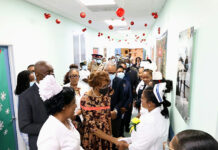
NASSAU, The Bahamas — Small Island States such as the Bahamas must address the importance of Agrifood systems in order to maintain sustainability. This was the message conveyed by the Minister of Agriculture and Marine Resources during the 38th Latin Agrifood Systems Transformation in Small Island Developing States Latin America and Caribbean Regional Conference, held in Guyana, March 19, 2024.
“All of our beautiful countries in the region are abundantly blessed with natural resources and diverse agricultural opportunities,” said Mr. Campbell. “Yet, we often overlook the potential for sustainable food production and consumption. In the Bahamas, we share your concerns because like you, we are severely vulnerable to the effects of climate change and fluctuating costs of living.”
He said that ‘significant efforts’ have been made to promote farming practices and support farmers in order to reduce dependence on imported food – a bill currently pegged at over $1 Billion dollars per annum.
“Firstly, we established a sustainable food grant, where established and aspiring farmers and fishers could access up to $40,000. This is our way of cultivating entrepreneurship. And while some may receive the grant, access to capital was also a challenge and so the Bahamas Agricultural and Industrial Corporation assisted by signing a Memorandum of Understanding with a local bank to provide loans to individuals wanting to start or expand their agricultural businesses.” He said that the Bahamian government has also granted 100 farmers acreage to begin farming in the capital of New Providence; an initiative, he says, will hopefully, be duplicated throughout the Family Islands.
Other partnerships with farmers include, ‘The Pineapple Project’ — a collaboration with experts from Costa Rica; and the ‘Golden Yolk Project’ for the production of eggs. He pointed out that the country currently produces about 750,000 eggs per annum but it anticipated that via the Golden Yolk Project, that number could increase to 27 million eggs — an increase of over 3,000 percent. The government is also working with the Bahamas’ Chinese Embassy on a project proposal to strengthen the poultry sector.
“Our Memorandum of Understanding with the People’s Republic of China, has also yielded fruitful results,” he said. “The Chinese Embassy donated 15 greenhouses, which we distributed to a number of schools across the Bahamas. Additionally, two Chinese experts also assisted with building more greenhouses and were able to grow produce and donated to several charities.”
He also noted that the government continues to partner with non-profit organizations to distribute backyard gardening kits, which help communities with establishing community farms. Investments have also been made in schools across the country to bolster agriculture programmes.
“These initiatives are only planting the seeds, and the Bahamas needs factors of production such as policies, technical assistance, data and research, to truly grow the sectors,” said Mr. Campbell.
“We believe that a continuous partnership with FAO and other advanced agrarian countries will assist farmers and fishers to overcome insurmountable challenges, stimulate more efficient local production, and increase access to more nutritious food.”







